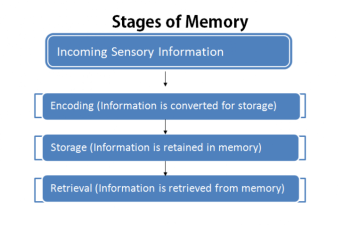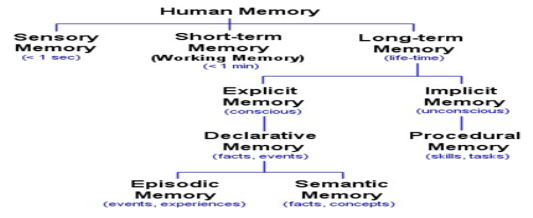Types and Stages of Observational Learning and Memory
| ✅ Paper Type: Free Essay | ✅ Subject: Physiology |
| ✅ Wordcount: 623 words | ✅ Published: 18 Sep 2017 |
This essay will address aspects of psychology by exploring different types and stages of Observational learning and Memory.
A Observational Learning
Learning is define as “the process of acquiring knowledge through experience which leads to a lasting change in behaviour” (Huczynski & Buchanan (2013), p.154)
There are two different types of learning – Observational and Associative learning.
The concept of observational learning was developed by Albert Bandura (1977, 1986 & 2000) to exclude trial-and-error method in learning. To compere both learnings, Associative learning is more tedious and more hazardous than Observational learning. Observes by observing may develop new behaviour and may have impact to previously learned behaviour.
Learning by Observation contains four stages and processes:
- Attention. Observers can only learn if they pay attention to a mentor or teacher. For example dancing classes. Attendants must observe and pay attention to teacher to learn how to dance.
- Retention. Observers must memorise information and store in to memory. In order to take next step must recall what was memorised before. For example learn how to use computer programs.
- Reproduction. Observes must replicate another behaviour. But there is a limitation factor of physical abilities. Example may be that humans can’t fly.
- Reinforcement. Observers will go through different stages and will be motivated to learn. According to Bandura’s (e.g. 1977) Social learning theory, experiment on children by letting them watch television and later motivate aggressive behaviour.
This study has important implications for the effects of media violence on children. (http://www.simplypsychology.org/bobo-doll.html 24/02/2017, 15:31)
Memory is the faculty of the mind by which information is encoded, stored, and retrieved (Atkinson & Shiffrin, 1968).
Memory is the process of maintaining information over time. (Matlin, 2005)
There are three Memory stages:
Encode: Visual (picture), Acoustic (sound), Semantic (meaning)
Store: Short-term memory or Long -term memory
Retrieve: context-dependent (similar situation) or state-dependent (similar emotional state)

(Diagram 1 source: https://www.psychestudy.com/cognitive/memory/stages 24/02/2017 22:44)
Different Memory types:

(Diagram 2 source: http://www.human-memory.net/types.html 24/02/2017, 17:30)
Sensory memory. Very short, if it’s not passed to Short-term memory it’s lost. For example the memory of sound/picture/word is held for a second only. Interference may prevent of memory recall. Sensory memory can be Iconic or Echoic.
Short-term/working memory is a step to a Long -term memory. It holds small amount of information up to seven (+-2) units at once by a limited time, encodes information. By repeating an information we can hold it in the working memory. For example to memorise phone number we repeat it several times. But also it can be easily forgotten. People surroundings and environment have an influence on working memory.
Long-term memory is more complicated. It holds information for a long time or for life-span and have unlimited capacity. There is three long-term memory systems:
Episodic (e.g. experience, specific events like 5th birthday party),
Semantic (facts, concepts, e.g. knowing that birds can fly)
Procedural (e.g. skills, how to walk).
Procedural is subcategory of Implicit memory (unconscious) and it uses past experience (e.g. musicians, in language development).
Episodic and Semantic are subset of Declarative memory, which is a subset of Explicit memory (conscious) and it holds facts and events that can be stored and consciously recalled(e.g. Learning to swim)
In conclusion, Learning without Memory does not exist.
References
Atkinson, R. C., & Shiffrin, R. M. (1968). Human memory: A proposed system and its control processes. In The psychology of learning and motivation: II Oxford, England: Academic Press. doi:10.1016/S0079-7421(08)60422-3
David A. Buchanan, Andrzej A. Huczynski. Organizational behaviour. 8th edition. Harlow, England Pearson (2013) p.154.
Matlin, M. W. (2005). Cognition. Crawfordsville: John Wiley & Sons, Inc.
http://www.simplypsychology.org/bobo-doll.html 24/02/2017, 15:31
Diagram 1 source: https://www.psychestudy.com/cognitive/memory/stages 24/02/2017 22:44
Diagram 2 source: http://www.human-memory.net/types.html 24/02/2017 17:30
Cite This Work
To export a reference to this article please select a referencing stye below:
Related Services
View allDMCA / Removal Request
If you are the original writer of this essay and no longer wish to have your work published on UKEssays.com then please click the following link to email our support team:
Request essay removal



